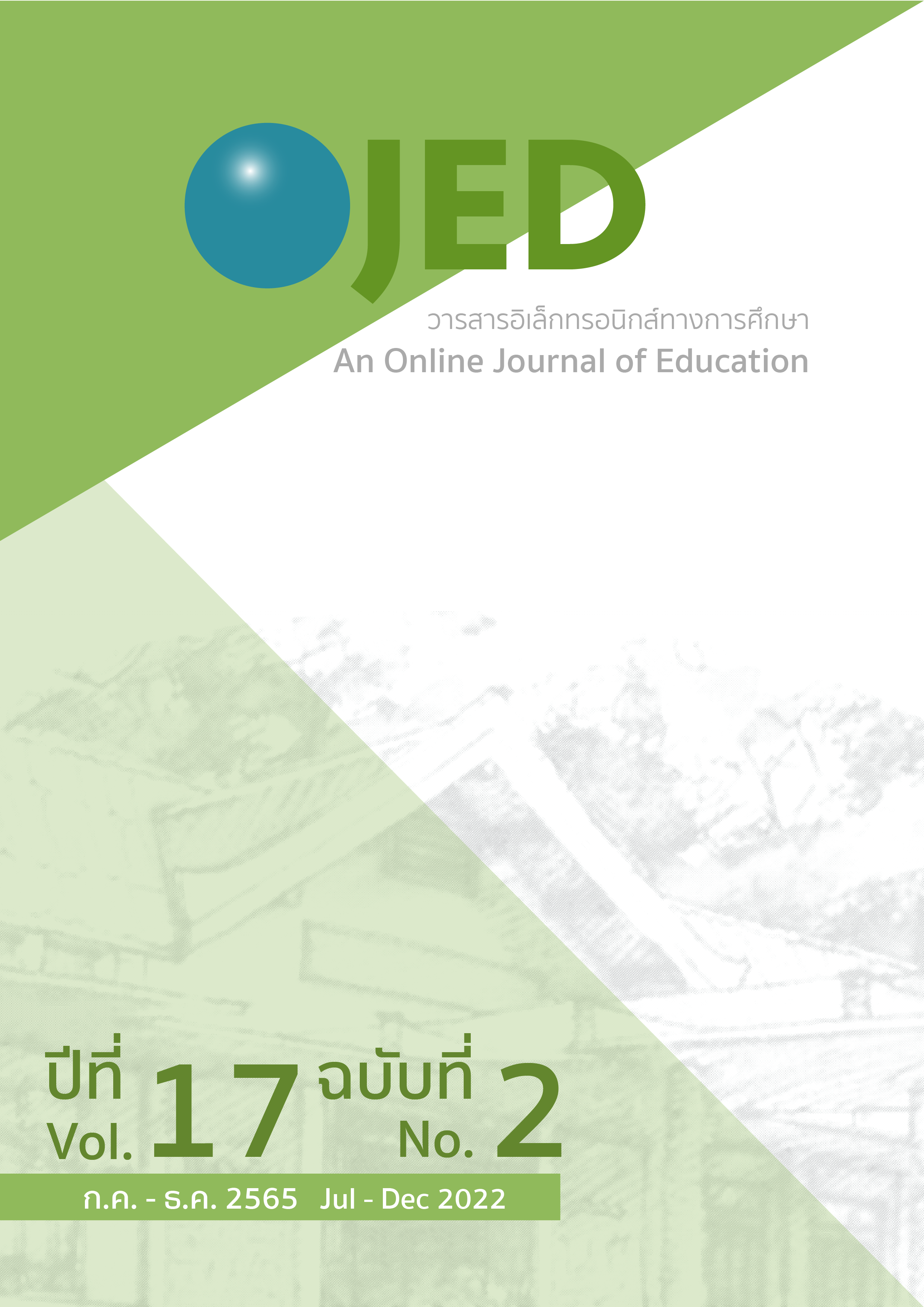Process of Organizing Learning Activity Using Metaphorical Thinking and Development of Mathematical Representation Ability of Secondary School Students
DOI:
https://doi.org/10.14456/ojed.2022.43Keywords:
metaphorical thinking, mathematical representation abilityAbstract
The purposes of this research were 1) to compare the mathematical representation ability of students before and after being taught through organizing mathematics learning activities using metaphorical thinking, 2) to compare the mathematical representation ability of the students after these activities with a criterion of 70% of the full score, and 3) to study the development of the mathematical representation ability of the students during learning activities using metaphorical thinking. The representative sample group were 36 seventh grade students. The data collection instruments included a pre-test and post-test of the students’ mathematical representation ability, a mathematical representation characteristics assessment form, and an interview. The data were analyzed by arithmetic mean, standard deviation, t-test, and content analysis. The results of the research revealed that 1) the mathematical representation ability of the students after being taught through organizing mathematics learning activities using metaphorical thinking was higher than at the pre-learning stage at the .05 level of significance, 2) the mathematical representation ability of the students after engaging in organizing mathematics learning activities using metaphorical thinking was higher than the criterion of 70% of the full score at the .05 level of significance, and 3) the mathematical representation ability of the students learning through organizing mathematics learning activities using metaphorical thinking had been improved in a positive direction.
References
ศูนย์ดำเนินงาน PISA แห่งชาติ, สถาบันส่งเสริมการสอนวิทยาศาสตร์และเทคโนโลยี. (2564). ผลการประเมิน PISA 2018 การอ่าน คณิตศาสตร์ และวิทยาศาสตร์. สถาบันส่งเสริมการสอนวิทยาศาสตร์และเทคโนโลยี.
สถาบันทดสอบทางการศึกษาแห่งชาติ. (2562). สรุปผลการทดสอบทางการศึกษาระดับชาติขั้นพื้นฐานปีการศึกษา 2562. สถาบันทดสอบทางการศึกษาแห่งชาติ.
สถาบันส่งเสริมการสอนวิทยาศาสตร์และเทคโนโลยี,กระทรวงศึกษาธิการ. (2555). ทักษะและกระบวนการทางคณิตศาสตร์. 3-คิว มีเดีย.
สาวิตรี มูลสุวรรณ. (2557). ผลของการจัดกิจกรรมการเรียนรู้ด้วยกลวิธีเอฟโอพีเอสที่มีต่อความสามารถในการให้เหตุผลทางคณิตศาสตร์และการใช้ตัวแทนความคิดทางคณิตศาสตร์ของนักเรียนชั้นมัธยมศึกษาปีที่ 2 [วิทยานิพนธ์ปริญญามหาบัณฑิต ไม่ได้ตีพิมพ์]. จุฬาลงกรณ์มหาวิทยาลัย.
อัมพร ม้าคนอง. (2553). ทักษะและกระบวนการทางคณิตศาสตร์: การพัฒนาเพื่อพัฒนาการ. ศูนย์ตำราและเอกสารทางวิชาการ คณะครุศาสตร์ จุฬาลงกรณ์มหาวิทยาลัย.
Febriyanti, N. K. S., & Wulandari, I. A. (2020). Mathematics learning interest of elementary school students in using metaphorical thinking learning model. Journal of Education Technology, 4(3), 273-278.
Haidar, I., & Jahring (2020). The effectiveness of metaphorical thinking approach to improve the mathematical representation ability. Jurnal Inovasi Pendidikan Matematika, 8(1), 54-61
Hendriana, H. (2017). Senior high school teachers’ mathematical questioning ability and metaphorical thinking learning. Journal of Mathematics Education, 6(1), 51-58.
National Council of Teachers of Mathematics. (2000a). Principles and standards for school Mathematics. National Council of Teachers of Mathematics.
National Council of Teachers of Mathematics. (2000b). Accessibility strategies for Mathematics. Principles and Standards for School Mathematics.
Navaneedhan, C. G., & Kamalanabhan T. J. (2016). Is metaphorical thinking related to development of cognitive structures among learners. World Scientific News, 52, 1-13
Downloads
Published
How to Cite
Issue
Section
License
Copyright (c) 2022 An Online Journal of Education

This work is licensed under a Creative Commons Attribution-NonCommercial-NoDerivatives 4.0 International License.




